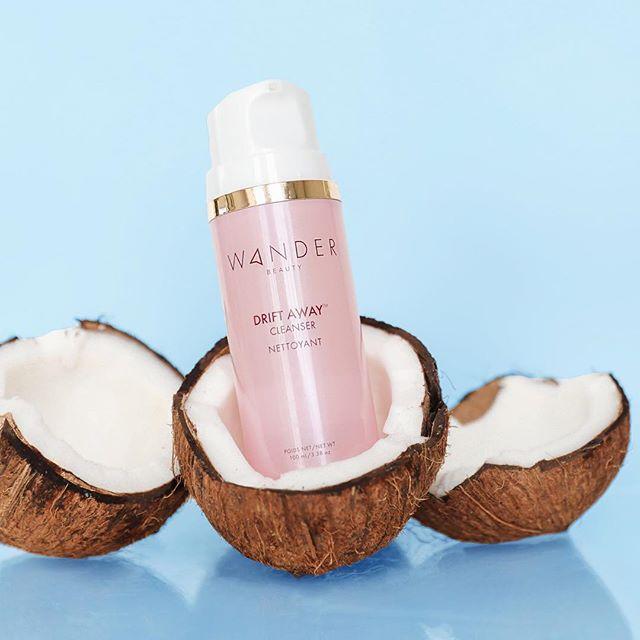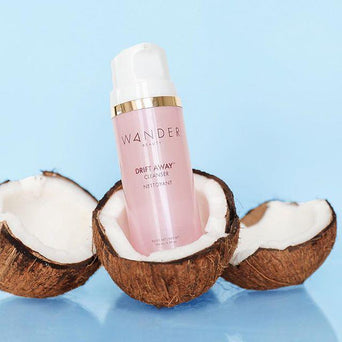The Truth About Coconut In Your Beauty Products
By Wander Beauty | Jun 12, 2019
It seems like coconut is all the rage right now. From coconut oil for cooking and makeup remover, to the smell of coconut in your sunscreen and pina coladas on the beach. We know here at Wander Beauty, we love it for it’s nourishing qualities. Coconuts have many uses in beauty products, and a few ways that this ingredient shouldn’t be used. In this post, we’re breaking down the truth on the best uses for coconut in beauty, what you shouldn’t use coconut for, what to look for in your coconut products, and how coconut oil is made.

Crazy for Coconuts
Yep, we are. Because coconuts in beauty products work, and serve as a natural remedy for removing makeup and hydrating. Coconut works because it cleanses without stripping the skin of key ingredients, and promotes healthy skin with its antioxidant benefits. With a healthy make up of vitamin C and thiamin, coconut in your beauty products will keep you feeling shiny and new. There are so many different ways to use coconut oil, so let’s talk about a few!
For your hair: Coconut oil is super hydrating, so it’s excellent for your hair. Try replacing your conditioner with a bit of coconut oil, or using it as a leave in conditioner or even a hair mask. As a hair mask, massage it throughout your hair and wrap your hair in a bun or a towel, and sleep in it overnight. Wash in the morning! You can also create a sleek bun or ponytail, using the coconut oil as a frizz tamer to keep the baby hairs at bay.
For your face: We hate to be the bearers of bad news, but coconut oil is not the miracle product we all thought it was - this oil is actually comedogenic, which means it can cause breakouts. So, you’re better off looking for coconut as an ingredient within your products (like Drift Away Cleanser) so that you get all of the benefits of hydration without the breakouts.
For your body: While coconut oil may not be ideal for your face, it’s actually a good oil for your body. Use coconut oil as an extra moisturizing shaving balm as a replacement to your shaving cream, or slather it onto elbows, heels and knees (where skin is thicker) to soften. It’s also a perfect cuticle oil and keeps nails hydrated!
Creating Coconut Oil
No, you can’t just go to your nearest coconut tree and cut open a coconut to create a hydrating face mask. There’s a very special way to create the coconut oil used in your products. Coconut oil is made from copra, which is basically the dried “meat” of the coconut oil, which happens through sun drying, smoke drying, kiln drying, or all of the above. The drying process isn’t always sanitary, so healthy coconut oil must be refined (or purified) in order for it to be safe and non-toxic.
You also may have heard of liquid coconut oil (also called MCT and fractionated coconut oil) which is created in a similar way. However, unlike refined, virgin coconut oil, liquid coconut oil is not found in nature. It is created. Liquid coconut oil doesn’t contain lauric acid, which is the most valuable fatty acid found in coconut oil (a powerful germ killer, and crazy healthy for you). To create fractionated coconut oil, it is heated to high temperatures, and when the oil separates, the liquid is kept and the base of the oil thrown out.
There are different types of coconut oil, and it’s important to choose organic, unrefined virgin coconut oil. The more the coconut oil is processed, the fewer the healthy benefits. Make sure you choose the most natural option. Remember, anything you put on your skin and hair is absorbed into the body!
Cons of Coconuts
Yes, coconut oil is a great natural alternative to harmful chemicals, and it can be a hydrating product, but only if you use it the correct way. However, there are a few ways that coconut oil shouldn’t be used. The main argument against this magic elixir is that coconut oil can clog pores, especially for acne-prone skin. The problem is that the molecules of coconut oil are too big to be absorbed into the skin. This causes pores to be clogged, leading to acne. Think about it: if you were to drop a full spoonful of coconut oil down your sink drain, you’d be calling the plumber next week. That’s what happens to your skin. So, while many use coconut oil (especially fractionated coconut oil) as an all-over moisturizer, it doesn’t deeply soak into the skin the way others oils will. If you were to apply coconut oil all over your body, a few hours later, your skin would still feel slick and oily, because it doesn’t absorb into your skin.
How We Go Coconuts at Wander Beauty
Though there are ways that coconut shouldn’t be used (like as a facial moisturizer), coconut contains many hydrating vitamins, and as an ingredient in your beauty products, it can be very helpful. In fact, many of our products at Wander Beauty contain coconut. By now you know coconut is a gentle cleanser and makeup remover, so our Drift Away Cleanser is packed with it. Also, our Flash Focus Hydrating Foundation Stick, Lipsetter Dual Lipstick, and Smooth Sailing 360 Eye Primer is full of coconut for it’s ultra-hydrating component.<product>1,2,3,4</product>
The takeaway? Coconut really is a 360 product, just be careful how you use it!
The Truth About Coconut In Your Beauty Products

It seems like coconut is all the rage right now. From coconut oil for cooking and makeup remover, to the smell of coconut in your sunscreen and pina coladas on the beach. We know here at Wander Beauty, we love it for it’s nourishing qualities. Coconuts have many uses in beauty products, and a few ways that this ingredient shouldn’t be used. In this post, we’re breaking down the truth on the best uses for coconut in beauty, what you shouldn’t use coconut for, what to look for in your coconut products, and how coconut oil is made.

Crazy for Coconuts
Yep, we are. Because coconuts in beauty products work, and serve as a natural remedy for removing makeup and hydrating. Coconut works because it cleanses without stripping the skin of key ingredients, and promotes healthy skin with its antioxidant benefits. With a healthy make up of vitamin C and thiamin, coconut in your beauty products will keep you feeling shiny and new. There are so many different ways to use coconut oil, so let’s talk about a few!
For your hair: Coconut oil is super hydrating, so it’s excellent for your hair. Try replacing your conditioner with a bit of coconut oil, or using it as a leave in conditioner or even a hair mask. As a hair mask, massage it throughout your hair and wrap your hair in a bun or a towel, and sleep in it overnight. Wash in the morning! You can also create a sleek bun or ponytail, using the coconut oil as a frizz tamer to keep the baby hairs at bay.
For your face: We hate to be the bearers of bad news, but coconut oil is not the miracle product we all thought it was - this oil is actually comedogenic, which means it can cause breakouts. So, you’re better off looking for coconut as an ingredient within your products (like Drift Away Cleanser) so that you get all of the benefits of hydration without the breakouts.
For your body: While coconut oil may not be ideal for your face, it’s actually a good oil for your body. Use coconut oil as an extra moisturizing shaving balm as a replacement to your shaving cream, or slather it onto elbows, heels and knees (where skin is thicker) to soften. It’s also a perfect cuticle oil and keeps nails hydrated!
Creating Coconut Oil
No, you can’t just go to your nearest coconut tree and cut open a coconut to create a hydrating face mask. There’s a very special way to create the coconut oil used in your products. Coconut oil is made from copra, which is basically the dried “meat” of the coconut oil, which happens through sun drying, smoke drying, kiln drying, or all of the above. The drying process isn’t always sanitary, so healthy coconut oil must be refined (or purified) in order for it to be safe and non-toxic.
You also may have heard of liquid coconut oil (also called MCT and fractionated coconut oil) which is created in a similar way. However, unlike refined, virgin coconut oil, liquid coconut oil is not found in nature. It is created. Liquid coconut oil doesn’t contain lauric acid, which is the most valuable fatty acid found in coconut oil (a powerful germ killer, and crazy healthy for you). To create fractionated coconut oil, it is heated to high temperatures, and when the oil separates, the liquid is kept and the base of the oil thrown out.
There are different types of coconut oil, and it’s important to choose organic, unrefined virgin coconut oil. The more the coconut oil is processed, the fewer the healthy benefits. Make sure you choose the most natural option. Remember, anything you put on your skin and hair is absorbed into the body!
Cons of Coconuts
Yes, coconut oil is a great natural alternative to harmful chemicals, and it can be a hydrating product, but only if you use it the correct way. However, there are a few ways that coconut oil shouldn’t be used. The main argument against this magic elixir is that coconut oil can clog pores, especially for acne-prone skin. The problem is that the molecules of coconut oil are too big to be absorbed into the skin. This causes pores to be clogged, leading to acne. Think about it: if you were to drop a full spoonful of coconut oil down your sink drain, you’d be calling the plumber next week. That’s what happens to your skin. So, while many use coconut oil (especially fractionated coconut oil) as an all-over moisturizer, it doesn’t deeply soak into the skin the way others oils will. If you were to apply coconut oil all over your body, a few hours later, your skin would still feel slick and oily, because it doesn’t absorb into your skin.
How We Go Coconuts at Wander Beauty
Though there are ways that coconut shouldn’t be used (like as a facial moisturizer), coconut contains many hydrating vitamins, and as an ingredient in your beauty products, it can be very helpful. In fact, many of our products at Wander Beauty contain coconut. By now you know coconut is a gentle cleanser and makeup remover, so our Drift Away Cleanser is packed with it. Also, our Flash Focus Hydrating Foundation Stick, Lipsetter Dual Lipstick, and Smooth Sailing 360 Eye Primer is full of coconut for it’s ultra-hydrating component.<product>1,2,3,4</product>
The takeaway? Coconut really is a 360 product, just be careful how you use it!


